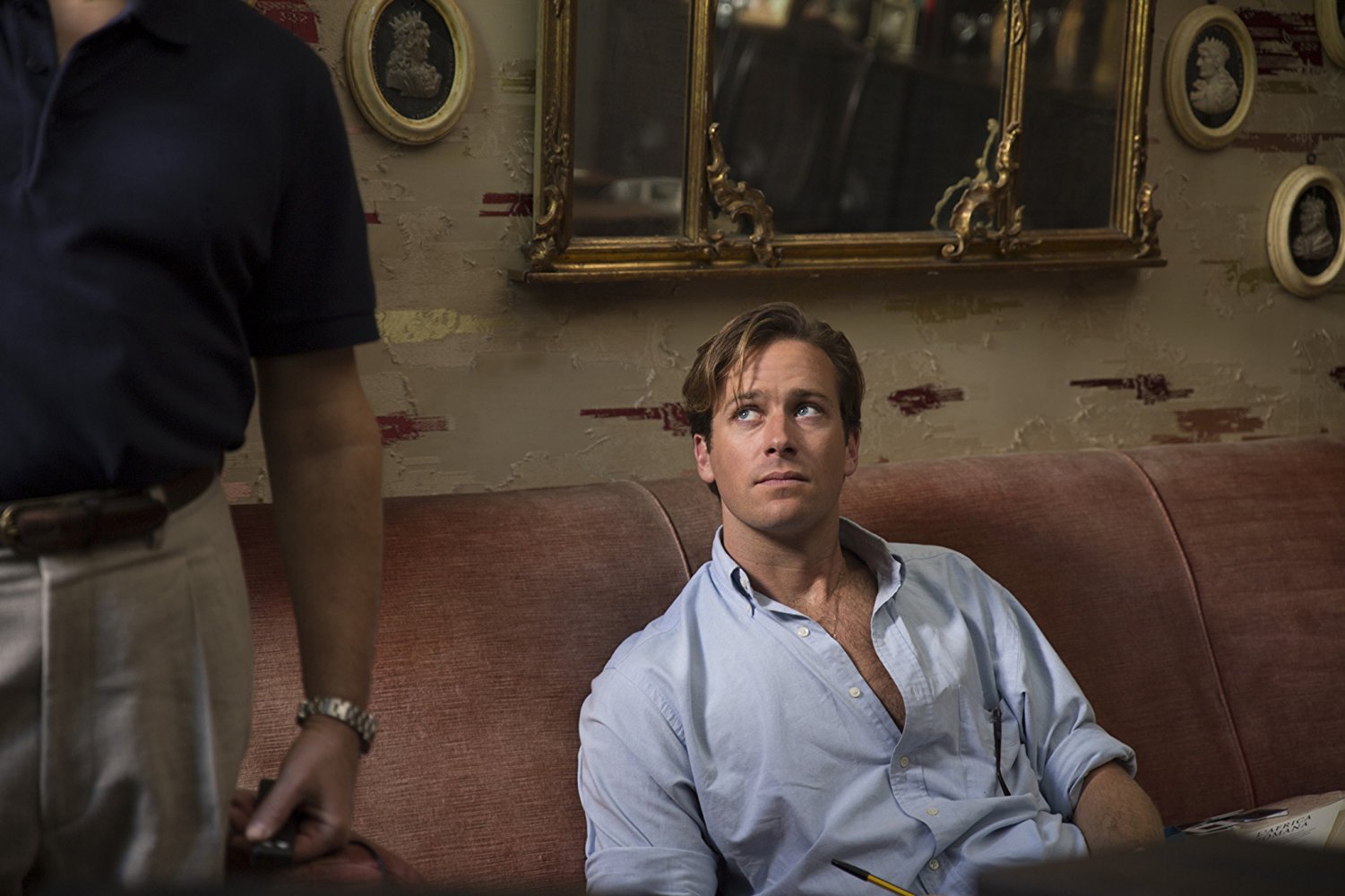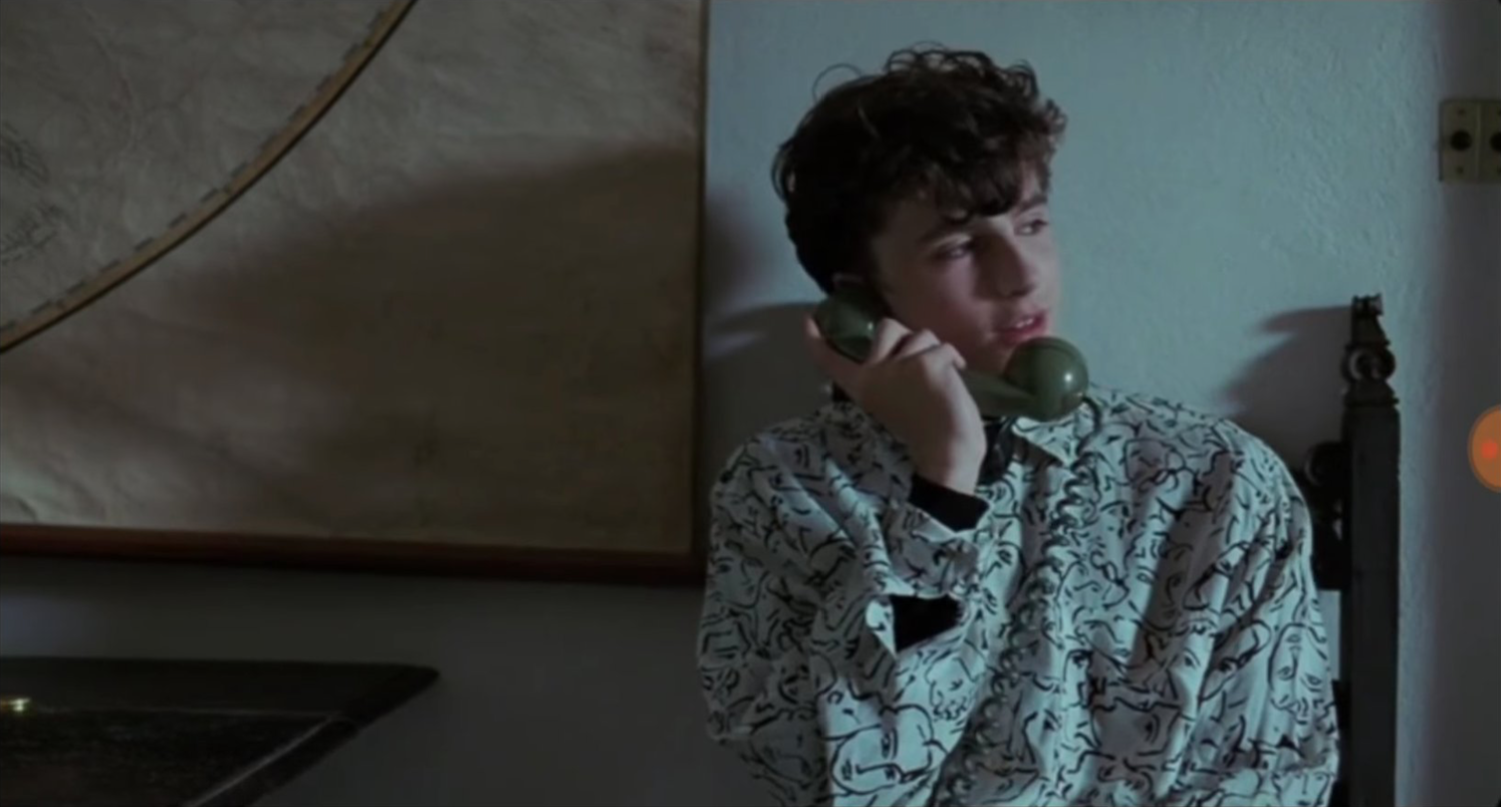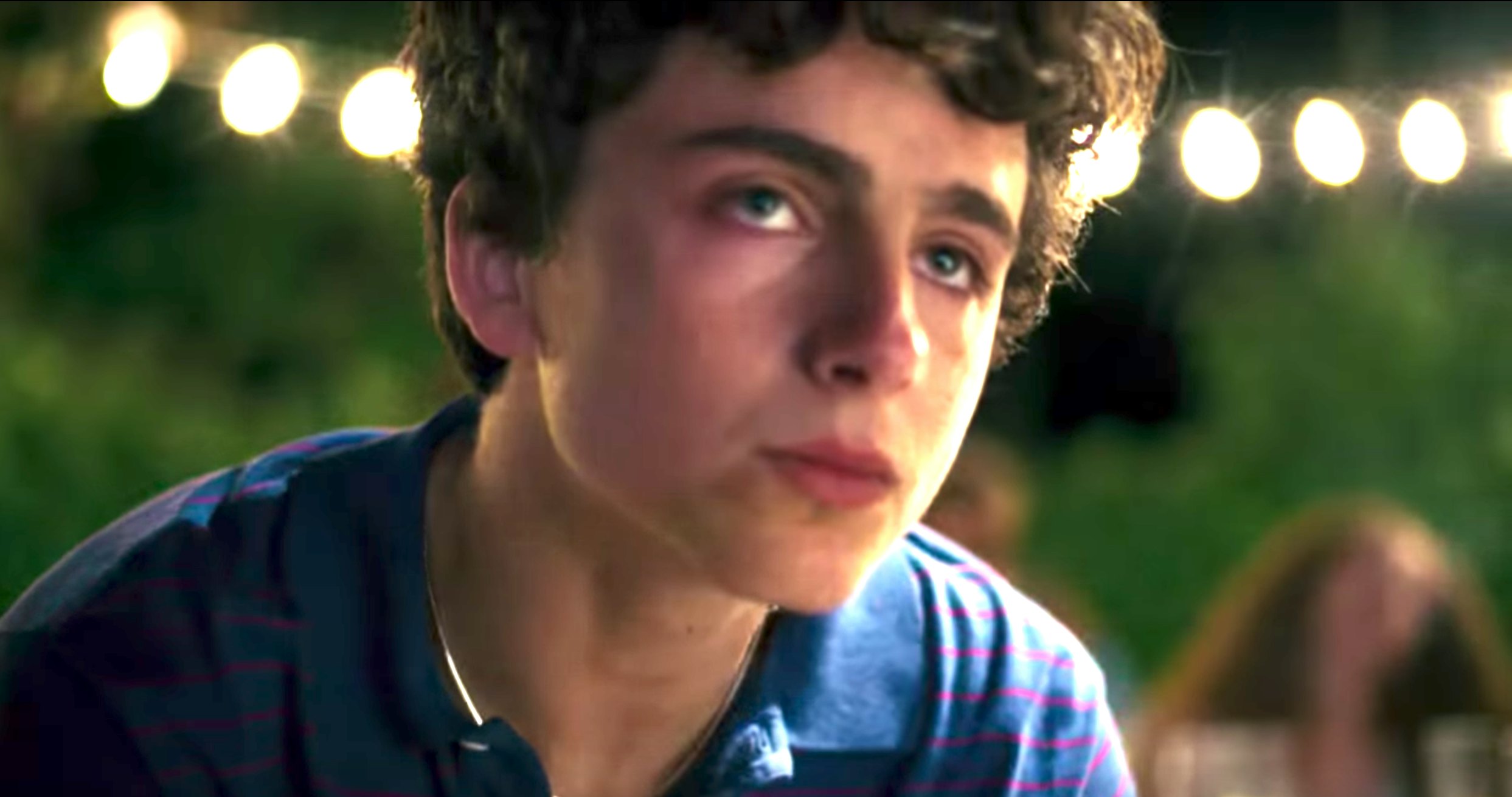CALL ME BY YOUR NAME, the new film by Luca Guadagnino, is a sensual and transcendent tale of first love, based on the acclaimed novel by André Aciman. It's the summer of 1983 in the north of Italy, and Elio Perlman (Timothée Chalamet), a precocious 17-year-old young man, spends his days in his family's 17th-century villa transcribing and playing classical music, reading, and flirting with his friend Marzia . Elio enjoys a close relationship with his father , an eminent professor specializing in Greco-Roman culture, and his mother Annella , a translator, who favor him with the fruits of high culture in a setting that overflows with natural delights. While Elio's sophistication and intellectual gifts suggest he is already a fully-fledged adult, there is much that yet remains innocent and unformed about him, particularly about matters of the heart.
One day, Oliver , a 24-year-old American college graduate student working on his doctorate, arrives as the annual summer intern tasked with helping Elio's father. Amid the sun-drenched splendor of the setting, Elio and Oliver discover the heady beauty of awakening desire over the course of a summer that will alter their lives forever. Before and during filming, the actors lived in Crema and were able to experience small-town life. Guadagnino engaged with the cast and filmmakers and often cooked for them and showed films at his house.
Hammer and Chalamet, who did not have to do a screen test together, met for the first time during production in Crema. Before filming began, they spent a month together, watching TV and going to local restaurants. "We'd hang out with each other all the time, because we were pretty much the only Americans there, and we were able to defend one another and really get to know one another," Chalamet said.
During the first two days of production, Guadagnino read the script with the cast. The first scene that Hammer and Chalamet rehearsed was the kissing scene, and they spent several days filming nude. "I've never been so intimately involved with a director before. Luca was able to look at me and completely undress me," Hammer said.
I can't remember a film that better captures that kind of madness and heightened attention to not just the object of desire but also the world at large. Nor can I recall a movie that more directly appeals to all of the audience's senses to make them feel what's happening onscreen. It's undoubtedly a gay love story, though it's less about coming out than coming of age. Call Me by Your Name is a lush, heady experience for the body, but it's also an arousal for the soul.
"Call Me By Your Name" is a reference to the 2017 film directed by Luca Guadagnino. On the surface, Lil Nas X's single has a great deal in common with the cult gay romance portrayed in the film. There is the discovery of new love, the tension of closeted romance, the excitement of sex and travel. However, the similarities break off at the point of representation. The actors in "Call Me By Your Name" do not personally identify as queer men, meaning they were simply playing a part, an identity they could walk away from.
The stakes are somewhat different for Lil Nas X. His "Call Me By Your Name" is more than just a coming-out story — it is an audacious step into the public eye as an unapologetically queer Black man. The role is demanding -- Elio is a gifted multi-instrumentalist who's highly intelligent and articulate and possessed of a kind of unsure charm. That's a lot, and Chalamet delivers it all while losing himself in an unexpected emotional rollercoaster. Hammer, meanwhile, is ideally cast as an all-American golden boy who's all confidence and ease.
His Oliver is good at everything, but when he finally tips his hand romantically, he has endearing moments of vulnerability. And everyone should be so lucky as to have parents as interesting and understanding as those played by Almira Casar and Stuhlbarg. The dialogue, while highly intelligent, stays emotionally understated until the relationship blossoms, containing itself in all-subtext scenes like a wonderfully choreographed confession staged around a statue in a public square. There does seem to be a moral to this story, expressed in a simple, lovely scene of comforting. In celebrating the irreplaceable glory of love in the face of the agony of loss, one character says, "To make yourself feel nothing so as not to feel anything ... what a waste." What their romantic lives have been like prior to their meeting, they never say.
Is Oliver the first man with whom Elio has had an intimate relationship? Has Elio been able to acknowledge, even to himself, his attraction to other men, or is the awakening of desire for a male a new experience for him? Though Elio and Oliver are also involved with women in the course of the summer, they don't ever discuss their erotic histories, their desires, their inhibitions, their hesitations, their joys, their heartbreaks.
Guadagnino can't be bothered to imagine what they might actually talk about while sitting together alone. Scenes deliver some useful information to push the plot ahead and then cut out just as they get rolling, because Guadagnino displays no interest in the characters, only in the story. Timothee Chalamet gives an incredible performance fully deserving of all the accolades, but I found Armie's inconsistent at best. Maybe it's just that I didn't find his character particularly appealing...
To me he comes across as rather abrupt and arrogant, and weirdly passive-aggressive and patronising towards Elio for much of the time. The physical scenes between Oliver and Elio were excruciatingly awkward to watch and didn't ring true to me - but I'm a straight female so what would I know? I haven't had that reaction with the other gay films I've seen though.
Maybe it was supposed to reflect real life, or maybe I am just too accustomed to male-female depictions. Ultimately the relationship seemed to consist of Elio being infatuated and Oliver enjoying being the object of that infatuation, rather than a true love story. Costume designer Giulia Piersanti avoided using period costumes; instead, she wanted to provide "a sense of insouciant adolescent sensuality, summer heat and sexual awakening" to the characters. The costumes, which were influenced by the French films Pauline at the Beach , A Tale of Springtime and A Summer's Tale , included some pieces made by Piersanti's team.
For the Perlmans' wardrobe, Piersanti took inspiration from her parents' photograph albums. For Oliver's "sexy, healthy American" image, Piersanti referred to "some of Bruce Weber's earliest photographs". Oliver's clothes change throughout the film as "he's more able to free himself". Aiming to emphasize Elio's confident style, she chose several Lacoste costumes and a distinctive, New Romantic-looking shirt in the final scene. For Elio's other costumes, Piersanti picked some items from her husband's closet, including the polo shirt and Fido Dido T-shirt.
Most of the reception for the movie emphasized its devastating and candid love story, with considerable criticism involving the age gap between the two male lovers. But Aciman says that Find Me, coming Oct. 29, is not an "obvious sequel." In an exclusive interview with TIME, the author explains why he chose to enter the story not through Elio or Oliver but instead through Elio's father Samuel. Find Me does not simply continue where Call Me By Your Name left off — the new book's dialogue-heavy vignettes fill in gaps left in the final chapter of the original, which flashed forward into brief scenes of the 20 years after Elio and Oliver's intimate summer. A book that muses on big themes of love, fate and the effects of time, Find Me provides a lot to discover between the lines. Aciman answered all our biggest questions about the Call Me By Your Name sequel.
I am of the belief that the elevated sense of existence felt when in the presence of others—love, if you will—is the closest we can come to describing the Jewish concept of G-d. Replace Adonai or G-d or any other name for the Abrahamic יהוה with "love," and the message of every prayer, psalm, and blessing remains the same. The trust, awkwardness, and innocence that exists between Elio and Oliver perfectly exemplifies this spiritual, undeniably Jewish love.
The mantra "call me by your name, and I'll call you by mine," that Oliver states at the beginning of their tangible romance deepens this idea of shared identity into the most interpersonal of experiences. The Jewish need for community, in this instance, becomes Elio and Oliver's relationship. Each person has only one name, and to intimately give that away for the sake of encouraging an elevated sense of belonging with another person is perfectly aligned with the Jewish concepts of love and holiness that are reliant on connections with other people. One of the most interesting aspects of a fly's life, at least narratively speaking, is just how short it is. This impermanence has inspired artwork from the Dutch vanitas tradition of the early 17th century to the contemporary podcast The Heart, which produced a mayfly-inspired three-part episode called One Day's Love.
"The mayfly sneaks in through an open window and lives her mayfly life to the fullest—perhaps even finding her true mayfly love," the short post accompanying the first episode reads. She lies limply in the windowsill." I choose to believe that Guadagnino was using these annoying little insects to remind us that no matter how badly the audience or Elio wanted it, his romance with Oliver would always be ephemeral. And sometimes, the list of summer's casualties includes you. The miraculous nature of the story stems not only from Elio and Oliver overcoming their fears, but also from the way the obstacles they face simply vanish—because, we later learn, those obstacles were illusory for them. In the monologue Elio's father gives toward the end of the film, forbidden love is made okay, even encouraged. More than that, Mr. Perlman's confession—that he has wanted, but never had, the kind of relationship his son has enjoyed—marks the moment when Call Me by Your Name telescopes out.
An intimate, specific story must be considered against the larger circumstances that queer people faced. In that context, it becomes a tale, more broadly, of liberation—and perhaps its limits. "If I paired the age of Elio in the film with the age of Timothée, in three years' time, Timothée will be 25, as would Elio by the time the second story was set", he said. In the novel, Elio and Oliver reunite 15 years later when Oliver is married. Guadagnino said that in the sequel, "I don't think Elio is necessarily going to become a gay man. He hasn't found his place yet ... I believe that he would start an intense relationship with Marzia again."
Reaction to the advertisement on social media was somewhat negative, largely because of Sony Pictures' misleading use of an image of Chalamet and Garrel instead of a focus on the protagonists' relationship. Daniel Megarry of Gay Times described it as "an attempt to 'straight-wash' the movie's predominant same-sex romance". Benjamin Lee of The Guardian called the ad a "disastrous attempt to push Oscar-buzzed Call Me by Your Name as a straight love story", and said the advert "belies an industry awkwardly denying queerness". Sony Pictures Classics later aired several commercial spots to promote the film during its U.S.-wide expansion on January 19, 2018. To promote the film in South Korea, Sony Pictures released several never-before-seen set photos and pastel promotional posters illustrated by Son Eunkyoung in March 2018. Guadagnino selected the music for Call Me by Your Name himself.
He wanted to find an "emotional narrator to the film" through music, in a "less heavy, less present, and more enveloping" way than voice and text. The films Barry Lyndon , The Magnificent Ambersons , and The Age of Innocence inspired him. Guadagnino wanted the film's music to be connected to Elio, a young pianist who enjoys transcribing and adapting piano pieces and uses music to deepen his relationship with Oliver. Music is used in the film to reflect the period setting, the characters' family life and their level of education, and "the kind of canon they would be a part of". Guadagnino also researched which pop songs had been played frequently on local radio stations that summer.
What Is Meaning Of Call On You Guadagnino did not want the film to be a period piece and tried to resist making a film that would reflect "our idea of the 80s". A few soundtrack songs also describe a longing to touch, especially when the characters cannot find the words or the courage to do so themselves. With the emotionally devastating final shot, Stevens' "Visions of Gideon" begins with the resonant piano chords and pulsating repeated notes that recall other piano works by Ravel, Adams, and Sakamoto that have played previously in the film. He sings, "For the love, for laughter, I flew up to your arms," capturing the connection between touching and feeling that this story portrays.
When we hear "I have touched you for the last time" just as the closing title appears, we might never want that feeling to end. The music video does something similar with classical iconography. The opening sequence, set in the Garden of Eden, features Roman and Greek architecture. Later on, statues jeer at Lil Nas X from the stands of a Roman amphitheater. Although the song has received bad faith criticism for its use of sexualized biblical and Satanic imagery, the integration of angels and demons builds upon the symbols established by the 2017 movie. By combining biblical figures, Roman and Greek iconography and a homoerotic narrative, the directors of the music video — Tanu Muino and Lil Nas X himself — harmonize symbols of the LGBTQ+ experience.
For that matter, Guadagnino offers almost nothing of Elio's parents' talk about whatever might be going on with their son and Oliver. Not that the parents are absentee—they're present throughout, and there are even scenes featuring them apart from both Elio and Oliver, talking politics and movies with friends, but there isn't a scene of them discussing their son's relationship. They don't express anything about it at all, whether approval or fear or even practical concern regarding the reactions of the neighbors. The elision of the characters' mental lives renders "Call Me by Your Name" thin and empty, renders it sluggish; the languid pace of physical action is matched by the languid pace of ideas, and the result is an enervating emptiness. I stumbled upon the movie when I saw the trailer in 2020, three years after the release.
This book left me with a sadness and nostalgia for days that I didn't even know the reason for. Its beautifully written in the perspective of a 17 year old and even though he is feeling it for a man, it relates to all of us and our first crush and first relationship as a teenager. Love but has only one language, no matter which year, whcih country or which orientation. What I hadn't anticipated when I began reading this book was, how Elio's thoughts seemed so universal, such as, "Does he hate me?", "What am I doing wrong?", "Do I deserve this?". We have all gone through such doubts about ourselves from time to time.
But Elio seems to never stop beating himself up over small things. Especially when he's smitten by the brooding and attractive American resident at his summer house in Italy, in the 1980s. Their attraction and curiosity toward each other brings them as close and throws them as far as they can imagine. But the passion between them is more searing than fire itself and all-consuming. I found myself feeling for Elio and his valid doubts about his worthiness towards Oliver, who in turn shows us his vulnerable side after a while.
I'm don't usually enjoy the Romance genre but this one completely stumped me. The vivid imagery and genius of Andre Aciman leave you gasping for more. Elio and Oliver were characters larger than life and almost tangible. On closer inspection, the song appears to be about the spiraling anonymity of closeted love, a story that does not promise a happy resolution.
At the end of the music video, Lil Nas X walks up behind Satan and breaks his neck. The singer then takes off the devil's horns and puts them on himself. This is a coronation of sorts, but a distinctly unromantic one. For all the exquisitely choreographed sensuality of the music video, it is not really about sex.
Lil Nas X uses his closeted partner as a foil against which to create an image of radical self-acceptance. Luca Guadagnino is sitting in a hotel in Beverly Hills, but his mind is back in Italy. The 46-year-old director is doing press duties forCall Me By Your Name, his rapturous romance about star-crossed lovers falling for each other over one memorable, wistful summer. (It hits theaters on November 24th.) And when he's asked if he's ever had a comparably whirlwind, sun-splashed fling – one that may have helped inspire his sensual, startling love story – you get the sense that the filmmaker has momentarily left the room.
He is now somewhere back in his native country, imagining the sound of lapping waves and cicadas, maybe a light breeze blowing as dusk sets. I'm not suggesting that the movie telegraphs Elio's future as one of sickness (Guadagnino has talked about filming sequels that follow these characters years later, Before Sunset–style, and the book closes with a series of flash-forwards). The critic Eric Eidelstein persuasively argues that the film's flies and blood could be red herrings, subverting the cliché of the ill-fated gay romance. But the flip side of that subversion is an understanding that prejudice is not the only reason gay people have, so often, been saddled with tragic stories in pop culture. It is an understanding that the year's other splashy European queer film, 120 Beats Per Minute, about AIDS activism in Paris in the early '90s, need not be seen as a foil to Call Me by Your Name but as a companion piece.
Self-actualization—or simply loving as one wants—was not the entire struggle. Sometimes labels are crucial in forming strategic political alliances. But it's worth noting that in a recent poll, over half of the young adults surveyed saw themselves not as "homosexual" or "heterosexual", but as "something other than straight". And Elio and Oliver don't see the biological sex of their love object as constitutive of their identity. Both the film and the novel make it clear that they each have had relationships with women as well as men. In an interview for Time in October 2018, Chalamet compared the sequel to Richard Linklater's Boyhood and said that Hammer, Aciman and Guadagnino were all intended to return for the next film.



























